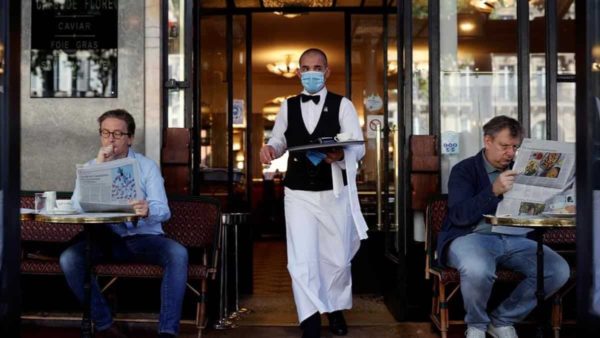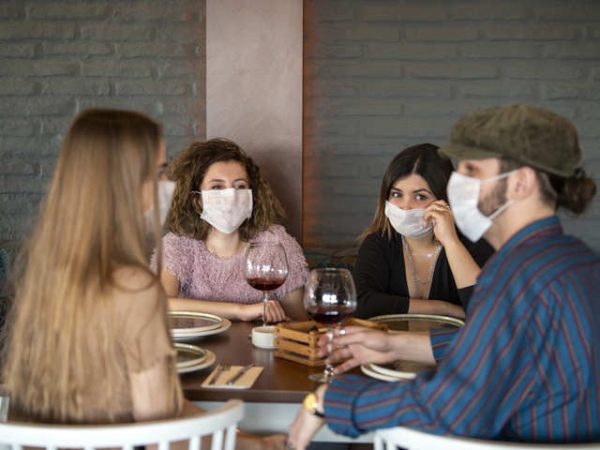As with most consumerist pursuits in America, we think of dining out transactionally. A restaurant visit is a decision to pay for culinary pleasure, where our senses are centered in the delivery of nourishment beyond what we need and hedonism that we cannot reproduce in our own homes. Some are grateful for that exchange, others carry with them an attitude that talented chefs are lucky to have a hungry audience willing to pay to taste their cooking. To those unfortunate souls, the higher the cost of a meal, the more pleasure they expect in return.
Entitled diners have a tendency to oversimplify this calculus in a way that obscures their understanding about the proper cost of a meal. Those people might accuse a $50 steak of being too expensive by comparing it to a $20 steak they can buy from their local butcher or a $30 dollar steak served in a more casual eatery. The restaurant industry is competitive, which makes it easy for guests to abdicate their role in sharing the financial burden restaurants face like escalating rents and rising labor costs.
Aggrieved parties that write negative restaurant reviews online almost uniformly complain about prices. These guests don’t tend to evaluate a restaurant experience in terms of whether or not it was enjoyable but whether or not they perceived the transaction as profitable. Online critics and restaurant owners rarely see eye to eye on the appropriate cost of a great meal.
The forced deprivation caused by quarantine measures should make us all realize what an immense privilege it is to dine out. We’ve spent the greater part of the last few decades fetishizing chefs’ culinary imaginations and living out our voyeuristic fine dining fantasies through the lenses of our smartphone cameras. The more we conceive of our dining selves as vessels for arousal, the less we bring to the table in terms of making those sparks fly. Sex is never good if you just lay there. It’s the same at the dinner table. The restaurant industry needs your love right now, not your lust.

A restaurant’s primary function has always been to provide the public sanctuary. Its protracted absence has made public life less vibrant. Even as the pandemic ravages our industry, though, restaurants have continued to find innovative ways to welcome guests, facilitating intimacy at a time when proximity to others is forbidden.
Without restaurants, we’ve learned how integral the act of dining out is to the way we socialize. Meeting friends for drinks cannot be simulated with the same warmth remotely. Restaurants still provide the backdrop for indelible memories—romance, friendship, business deals, and celebrations. Without the adrenaline rush of a crowded dining room and the heartbeats of others, food cannot have the same impact. Restaurants are conduits for human connection.
Most of us haven’t comfortably occupied a seat in a restaurant in months. If we have, it probably didn’t put us at ease the way we remembered. The virus has placed a choke hold on the hospitality industry and suffocated so many hard-earned careers. Building a profitable restaurant takes years, but it takes only a matter of months to bankrupt one.
The industry won’t have an easy time digging itself out of this hole, but there are things we can do as guests to support the recovery effort, beginning with rearranging our mentality about the role we play in their success. If we want our favorite restaurants to survive, we need to be more than paying customers.
Having a deeper appreciation for the role that restaurants play in our communities means thinking not just about where we dine but about how we dine.
Guests who approach restaurant visits with the mentality that its primary function is to provide pleasure make it increasingly difficult for restaurants to please them. The constant burden to prove themselves is exhausting for restaurant professionals and fosters hostility in our workplaces, hastening burnout and substance abuse. Hospitality will have to change in the aftermath of the pandemic, but guests should too. You can help alleviate some of that strain by approaching future dining experiences more empathetically.
Start by thinking differently about what it means to have a reservation. With seating capacity limited in many municipalities, the effect of reneging on a reservation is even more devastating. Respecting your allotted time and being punctual is even more critical to a restaurant’s financial health than ever before. Ask the host upon arrival if he or she will need the table back. Even if there is no time limit, express your willingness to return the table if need be. The pandemic is making perilously thin margins even thinner. Yesterday’s dollars are needed to pay today’s bills. Without yesterday, there is no tomorrow.
Be vigilant about new safety protocols. Understand that doing so ensures the wellbeing of the people sacrificing their own health to serve you. Even though wearing a mask can be awkward while you’re trying to enjoy a meal, try to keep it on when servers visit your table. These sterile impediments hinder the staff’s efforts to deliver fluent service more than they do your comfort. Paying for a meal shouldn’t exempt you from abiding by the rules.
Table assignments also fall into this category. To maximize efficiency and profitability, restaurants have a floor plan that acts as a schematic for maximizing revenue. The pandemic has forced many restaurants to drastically gerrymander the way they partition space. Putting together this Tetris pattern has become even more complicated with the spatial restrictions and restrained seating capacities caused by COVID-19. Even if you don’t love the table to which you’ve been assigned, try to make the best of it without protest.

Return the table in a reasonable amount of time. Guests who overstay their welcome make an already challenging situation even worse. A restaurant is a finite space. It needs available seats to sell more food, and it needs to sell more food to stay open. Since March, most restaurants are operating at fifty percent capacity or less. When people monopolize their seats, it hurts twice as much.
Its helpful to think of a restaurant reservation like booking an AirBnb. Even though you’re paying a premium to stay there, you’re still a guest in someone else’s home. Good guests will recognize the privilege of occupying a space that isn’t theirs and treat it with the same respect they would their own homes. You have a check-in time and a check-out time that must be adhered to. Making unreasonable demands of your host just because you paid for it would be untoward, and doing so might risk jeopardizing your standing on the platform.
In the end, it’s incumbent upon each individual guest to monitor his or her own conduct and that of their company. This could apply to someone in your party who refuses to follow whatever safety protocols are in place. It’s unfair to put the onus on management to diffuse the situation when you and your other dining companions could easily police the situation yourselves.
There are other ways to support restaurants beyond your comportment as a guest. Since March, many people have bought gift cards from their favorite restaurants or donated to staff GoFund Me accounts. Take it a step further. Stop into your favorite local restaurant. Talk to the owners. See how they’re doing. Ask what they need. Perhaps your church group has a holiday event catered every year. Offer to front the payment. If there are any business services you can offer through your profession, make them pro-bono. Volunteer a day of labor or offer to help clean the area outside of the restaurant. Do anything that might help offset input costs or increase revenues.
Most restaurants function like non-profit businesses, so donating your time and money to support one isn’t really that much different from charitable giving. It’s for a good cause. Your neighborhood restaurants provide a vital service to the community and should be considered as integral to its health as schools, parks, religious centers and libraries. Only a very small fraction of restaurants actually make money. Sixty percent of restaurants don’t make it past their first year, and eighty percent go out of business within five years.
The disruption caused by the pandemic presents the perfect opportunity to begin changing our behaviors to be more accommodating toward restaurants. As so many of our beloved establishments close, we’ve learned how fragile these businesses are and how much less dynamic our communities are without them. When iconic restaurants close, they take an irreplaceable part of a city’s cultural history with them. As the surviving restaurants in our neighborhoods begin to reopen, we should approach them with a renewed sense of responsibility about our role in their success beyond purchasing food. Simply put: Ask not what your restaurant can do for you, but what you can do for your restaurant.


This is as apropos in the midwest as it is in NYC. Very well said, and thank you.
Well done..! So many other industries rely on the success of restaurants. Wine & Spirits, Linen Services, Smallwares, Kitchen Equipment, etc…
Eloquent and spot on…I am jealous that I didn’t write it myself. It captured every ghost in the heads of restaurant owners, managers and servers perfectly.
[…] Adam Reiner | Dec 21, 2020 | Restaurant | 0 […]
we should treat our guests as our first priority. Because we are here to serve them . It is our duty to serve them with the best.